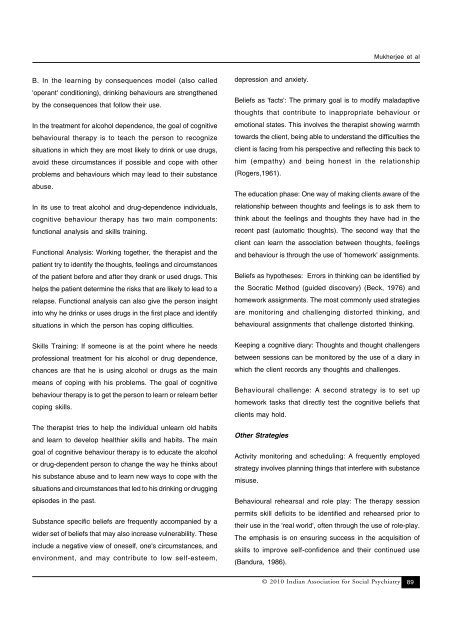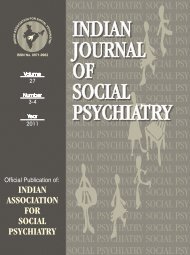IJSP-2010(3-4) - Indian Association For Social Psychiatry
IJSP-2010(3-4) - Indian Association For Social Psychiatry
IJSP-2010(3-4) - Indian Association For Social Psychiatry
You also want an ePaper? Increase the reach of your titles
YUMPU automatically turns print PDFs into web optimized ePapers that Google loves.
B. In the learning by consequences model (also called<br />
'operant' conditioning), drinking behaviours are strengthened<br />
by the consequences that follow their use.<br />
In the treatment for alcohol dependence, the goal of cognitive<br />
behavioural therapy is to teach the person to recognize<br />
situations in which they are most likely to drink or use drugs,<br />
avoid these circumstances if possible and cope with other<br />
problems and behaviours which may lead to their substance<br />
abuse.<br />
In its use to treat alcohol and drug-dependence individuals,<br />
cognitive behaviour therapy has two main components:<br />
functional analysis and skills training.<br />
Functional Analysis: Working together, the therapist and the<br />
patient try to identify the thoughts, feelings and circumstances<br />
of the patient before and after they drank or used drugs. This<br />
helps the patient determine the risks that are likely to lead to a<br />
relapse. Functional analysis can also give the person insight<br />
into why he drinks or uses drugs in the first place and identify<br />
situations in which the person has coping difficulties.<br />
Skills Training: If someone is at the point where he needs<br />
professional treatment for his alcohol or drug dependence,<br />
chances are that he is using alcohol or drugs as the main<br />
means of coping with his problems. The goal of cognitive<br />
behaviour therapy is to get the person to learn or relearn better<br />
coping skills.<br />
The therapist tries to help the individual unlearn old habits<br />
and learn to develop healthier skills and habits. The main<br />
goal of cognitive behaviour therapy is to educate the alcohol<br />
or drug-dependent person to change the way he thinks about<br />
his substance abuse and to learn new ways to cope with the<br />
situations and circumstances that led to his drinking or drugging<br />
episodes in the past.<br />
Substance specific beliefs are frequently accompanied by a<br />
wider set of beliefs that may also increase vulnerability. These<br />
include a negative view of oneself, one's circumstances, and<br />
environment, and may contribute to low self-esteem,<br />
depression and anxiety.<br />
Mukherjee et al<br />
Beliefs as 'facts': The primary goal is to modify maladaptive<br />
thoughts that contribute to inappropriate behaviour or<br />
emotional states. This involves the therapist showing warmth<br />
towards the client, being able to understand the difficulties the<br />
client is facing from his perspective and reflecting this back to<br />
him (empathy) and being honest in the relationship<br />
(Rogers,1961).<br />
The education phase: One way of making clients aware of the<br />
relationship between thoughts and feelings is to ask them to<br />
think about the feelings and thoughts they have had in the<br />
recent past (automatic thoughts). The second way that the<br />
client can learn the association between thoughts, feelings<br />
and behaviour is through the use of 'homework' assignments.<br />
Beliefs as hypotheses: Errors in thinking can be identified by<br />
the Socratic Method (guided discovery) (Beck, 1976) and<br />
homework assignments. The most commonly used strategies<br />
are monitoring and challenging distorted thinking, and<br />
behavioural assignments that challenge distorted thinking.<br />
Keeping a cognitive diary: Thoughts and thought challengers<br />
between sessions can be monitored by the use of a diary in<br />
which the client records any thoughts and challenges.<br />
Behavioural challenge: A second strategy is to set up<br />
homework tasks that directly test the cognitive beliefs that<br />
clients may hold.<br />
Other Strategies<br />
Activity monitoring and scheduling: A frequently employed<br />
strategy involves planning things that interfere with substance<br />
misuse.<br />
Behavioural rehearsal and role play: The therapy session<br />
permits skill deficits to be identified and rehearsed prior to<br />
their use in the 'real world', often through the use of role-play.<br />
The emphasis is on ensuring success in the acquisition of<br />
skills to improve self-confidence and their continued use<br />
(Bandura, 1986).<br />
© <strong>2010</strong> <strong>Indian</strong> <strong>Association</strong> for <strong>Social</strong> <strong>Psychiatry</strong><br />
89



